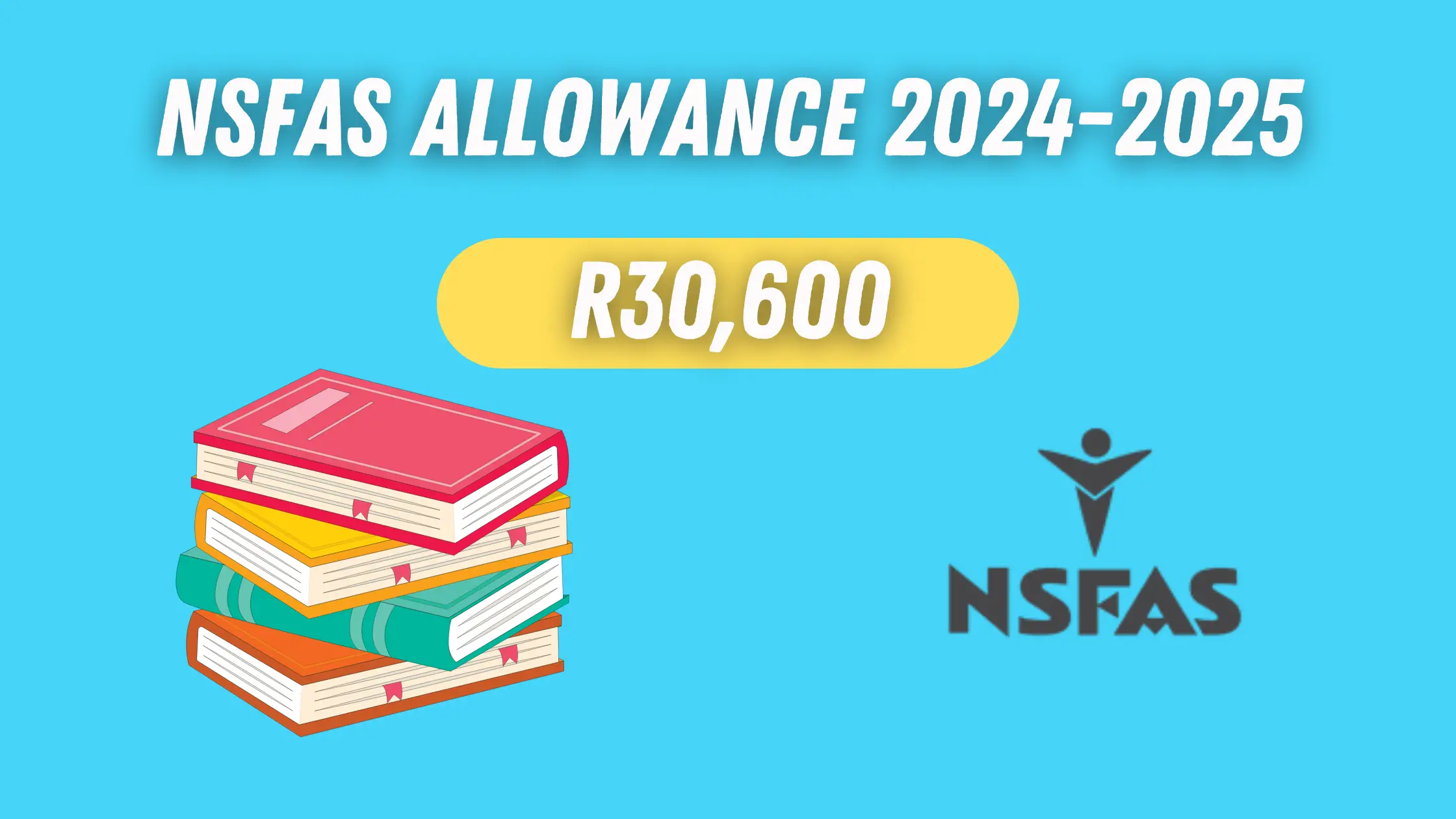This article delves into the heart of NSFAS, discussing its evolution and its essential contribution to South Africa’s education sector. Beyond that, we will delve into the changes you should expect in the NSFAS allowance for 2024-2025.
Total allowances for NSFAS 2024-2025 will be around R30,600. This includes R2,900 for personal care, R15,000 for living expenses, R5,200 for books and around R7,500 for travel. This will change slightly depending on if you are a TVET or University student and the location of you’re schooling.
NSFAS Allowance Breakdown for 2024-2025
TVET College NSFAS Allowance
- Urban area accommodation: R24,000 per annum.
- Peri-urban area accommodation: R18,900 per annum.
- Rural area accommodation: R15,750 per annum.
- Transport (within 40 km from the institution): R7,350 per annum.
- Transport: R7,000 per annum.
- Incidental/personal care allowance: R2,900 per annum.
University Students NSFAS Allowance
- Accommodation: Based on actual university charges (private accommodation costs should not exceed university residence costs).
- Transport (within 40 km from the institution): R7,500 per annum.
- Living allowance: R15,000 per annum.
- Book allowances: R5,200 per annum.
- Incidental/personal care allowance (for students in catered residences): R2,900 per annum.
NSFAS Allowance Changes In 2024-2025
Heading into 2023, the allowance provided by NSFAS stands as a critical component of the package. The allowance is meant to cater to students’ day-to-day needs, ensuring they can focus on their studies without worrying excessively about resources.
The specifics of the NSFAS allowance for 2024-2025 entail a total personal allowance of R30,600. This includes R2,900 for personal care and R15,000 for living accommodations. This can different depending on the location of your university or TVET.
Learners residing in university accommodations receive an additional meal allowance, while those who need to travel receive a travel allowance, addressing the spectrum of students’ needs.
There is a maximum allowance of R45,000.
Continuing its legacy of supporting numerous students in their educational journey, NSFAS aims to break down the monetary barriers to higher education in South Africa in 2024-2025 and beyond. The exact allowances may differ each year but the commitment of NSFAS to making education accessible remains unaltered.
Changes in NSFAS Allowance for 2024-2025
The National Student Financial Aid Scheme (NSFAS) in South Africa is reputable for its annual updates to the grants that consistently support South African learners. There have been several noteworthy changes to the NSFAS allowance for the 2024-2025 school year.
Factors Influencing Changes in NSFAS Allowance
The NSFAS often re-evaluates its allowance policy, influenced by the changing socio-economic circumstances. Rising inflation rates, GDP levels, and budget constraints imposed by the government are among the key factors that drive changes in the NSFAS allowances. For 2024-2025, such economic considerations have again played a significant role in the adjustments made.
NSFAS Allowance Eligibility Requirements for 2024-2025
In order to qualify for the NSFAS allowance in South Africa for the 2024-2025 academic year, students must fulfill several established criteria. These conditions have been set to ensure that the individuals who value higher education and need the monetary support the most will be the ones to receive it.
South African Citizenship
First and foremost, an applicant needs to be a South African citizen. The support model of NSFAS is built only for the native population, which is irrespective of ethnic or racial backgrounds. This initiative is taken towards building a better education system within the country and enhancing the skills and employability of South African youth.
Registration at a Public Institution
The potential beneficiary should also be registered at a public South African university or TVET college. NSFAS allowance is not applicable to students attending private institutions or studying abroad. This condition is set as NSFAS is a South African governmental body making efforts to improve the quality and availability of public education.
Income Threshold
An income threshold is another substantial criterion. The combined annual household income of the candidate must not be more than R350,000 for NSFAS funding. For students with disabilities, the combined annual household income must not exceed R600,000.
This criterion is designed to ensure that the funds are allocated to those individuals who cannot afford higher education due to financial constraints.
No Previous NSFAS Benefit
The NSFAS allowance eligibility criteria also state that applicants should not have benefitted from NSFAS in the past – a rule primarily intended to distribute resources to as many eligible students as possible. Exceptions may be made for returning students hoping to earn additional qualifications but are again limited to individuals who fulfill the rest of the criteria, including the income cap.
Application Process
Another significant factor is the application process itself. The candidate must have completed and submitted a self-certifying declaration form within the specified registration period. Late entries are generally not accepted unless under extenuating circumstances, and even then, it’s not a guarantee.
NSFAS Bursary Agreement
The applicant is also required to sign the NSFAS Bursary Agreement once they have been notified of a successful application. Until the agreement is signed, disbursements are put on hold by NSFAS.
Receipt of Allowance
It is critical to note that meeting the eligibility criteria is not a guaranteed receipt of the allowance. There are specific numerical limits set in accord with the allocated budget for the allowance for each academic year. However, fulfilling the eligibility rules will place the applicant into consideration.
How to apply for NSFAS Allowance in 2024-2025
The National Student Financial Aid Scheme (NSFAS) is a program in South Africa funded by the government. Its purpose is to provide financial assistance to underprivileged students who aspire to elevate their educational qualifications at public universities or TVET colleges.
The NSFAS allowance goes beyond merely covering the tuition fees; it also accounts for living expenses, which include food, personal care supplies, transportation, and accommodation. This wholehearted support helps students navigate their academic journey smoothly and effectively.
Eligibility Requirements for NSFAS Allowance 2024-2025
To be eligible for the NSFAS allowance in 2024-2025, applicants must be South African citizens from households with a combined annual income of R350,000 or less or R600,000 for disabled students.
Unemployed persons who fall under the South African Social Security Agency, students with disabilities, and students admitted to public universities and TVET colleges are also eligible for this financial aid.
Application Deadline
Although the actual dates might slightly vary each year, the NSFAS typically opens applications in the last quarter of the year, usually between September and December. Therefore, students interested in the NSFAS allowance for 2024-2025 should start preparing their applications in late 2023.
Steps to Apply for NSFAS Allowance 2024-2025
Before applying, applicants need to have a valid email address and a working cell phone number to facilitate communication with NSFAS. Moreover, they should have certified copies of supporting documents which include ID/birth certificates of the applicant and parents or legal guardians, and proof of income or SASSA grant.
To make the application, students should visit the NSFAS official website and click on the ‘MyNSFAS’ tab to create an account. After creating the account, applicants can log in using the details provided during registration. Once logged in, they will find the application form under the ‘Application’ tab.
The form requires applicants to fill in their personal details, contact information, as well as educational and socio-economic background. It is essential for applicants to declare all the necessary information accurately, as false declarations can lead to disqualification.
After filling in the application form, students need to attach all the necessary supporting documents before submitting their applications online.
Application Review and Award decision
After the application deadline, NSFAS reviews all applications based on the provided information and supporting documents. Successful applicants are notified via SMS or email, and the funding is disbursed directly to the institution where the student is enrolled.
To confirm the status of their application, applicants can log in to their ‘MyNSFAS’ portal or contact the NSFAS contact center. It is worth noting that the application process is entirely free, so applicants should be wary of any party asking for a fee to facilitate the NSFAS application.
In Summary
Getting informed about NSFAS doesn’t just broaden your understanding; it empowers you to utilize this opportunity proactively and accurately. The NSFAS allowance 2024-2025, the changes it incorporates, its eligibility criteria, and its impact on student life are pivotal aspects to take to heart.
And applying for this allowance requires a clear understanding of the process, which we’ve discussed in this piece. With this equipped knowledge, you stand on a strong pedestal to make progress in your academic pursuit, fortified with the necessary financial support given by NSFAS. Remember, this is not a mere government scheme; it’s a tangible step towards making your academic dreams come true.


